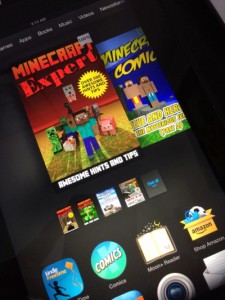1 August 2014 – In the midst of the Hachette-Amazon wars as well as the launch of Kindle Unlimited, there has been much hand-wringing about what it means to be a publisher, a writer, and a reader. One excellent piece by Laura Miller at Salon suggests that the “active readership for self-published books has agreed to go through America’s slush pile.” In other words, Amazon is letting anyone throw crap at the wall and we, the readers, have to see if it sticks.
But here’s what’s up: the book, as we know it, is changing. Books are about to go the way of magazines and newspapers. The value of a large hunk of text in prose form is diminishing and the price people will pay for it is also falling. For example, when Kindle Unlimited launched some analysts noted that the usual books and “long form fiction” that were available were downloaded but they did not dominate. What dominated? Minecraft-related tomes. You say they aren’t books? Ah, but they are.
Amazon is actively trying to change the way we think of books. For the last century, publishers have produced and distributed a certain number of very specific works in an economic system predicated on making “cheap” product – books made of paper and cardboard – and selling it at a premium. Remainders were pulped so they couldn’t circulate as new and second-hand books were a niche sales platform.
Now, with e-books, the value of those cardboard books is diminished considerably. Furthermore, the Big 5 has been reduced to selling books in an odd new way. Think of it as a sandwich: they sell lots of books that, in truth, would do well in Amazon’s Unlimited Minecraft store – celebrity biographies, cookbooks, political rants, and the like – in order to prop up a mid-list of literary efforts while blockbuster writers like Stephen King (hopefully) provide the rest of the revenue. The thick ham of fine literary effort is thereby squeezed to carpaccio.
Publishers like to say they offer a great deal of added value. I would agree. They have great editors, excellent artists, and good PR people. Historically the big publishers have been arbiters of taste, bastions of literacy, and highly skilled stewards of intellectual life. However, even with all that collective might they can’t always win.
I don’t think Amazon wants to mess with Hachette and other booksellers because it wants more money. It wants to mess with them because it wants to run a new market in monetized content delivery, of which e-books are a cornerstone.
Think about blogs. Books, to be clear, are intrinsically different from blog posts. They are longer, require a thorough editor, and take a long time to build. There are two ways to bring quality to books – spend a long time on them or hire a team of experts to polish until golden. Many indie writers barely have the resources to hire a copy editor. The quality of indie work, then, will always be in question.
But back to blogs. Journalists used to be the only writers who were paid to write quickly on a deadline (real or self-imposed). Now, thanks to Medium, WordPress and the like, the average writer can take payment in perceived reach and ancillary gigs like consulting while journalists – the ones working for big publishers – are floundering. Everyone can do what they did. Whine all you want about the perceived value of a copy-edited and fact-checked 500 words in the New York Times being the gold standard for journalistic effort. The people who work there, while talented, are no better or worse than the people who work for Techcrunch or at TMZ or Buzzfeed or at Joe’s Blog About Fishing. The difference is that the NYT was once mighty and, as such, has a huge institutional memory and still is able to maintain a network of contributors around the world. But all of the others – TMZ, Engadget, Buzzfeed – have monetized short-form writing. The NYT can’t monetize it enough to survive.
And thus will go the publishing industry. A thousand indie writers will eke out a living, a few dozen will make a lot of money, and big publishing will flail. I don’t think they’ll flail as spectacularly as the music industry, mostly because books are beloved by a certain intellectual subset and they’re proud to pay for paper books and to pay a little more for vetted, solid books by a large publisher. But they will flail nonetheless. Kindle Unlimited will get a certain type of reader used to indie writers, Amazon will make a cut when indie books are sold, and the Big 5 will be seen as the Big Bullies. It’s a win for Bezos.
I’m a writer. I love writing. I want my stuff to be read. I’m also well aware that there is a slush pile a mile deep out there of people who are in the same boat. But that’s fine. The blog slush pile, in the last decade, was a vast jungle of variegated content. Now it has consolidated into a few major players and a million smaller sources. The same will soon be true of indie publishers. It’s inevitable and Amazon is poised to make all kinds of money on every transaction.
But for me one difference I see with books vs other media types is that reading a book is a lot more commitment than reading a blog post, or listening to an unknown song. You read a worthless blog post and you have wasted a minute or two, but a book takes hours / days to read. I make that commitment. Which is probably why I have 6,000+ volumes in my library. Not all read. But I am getting close 🙂

